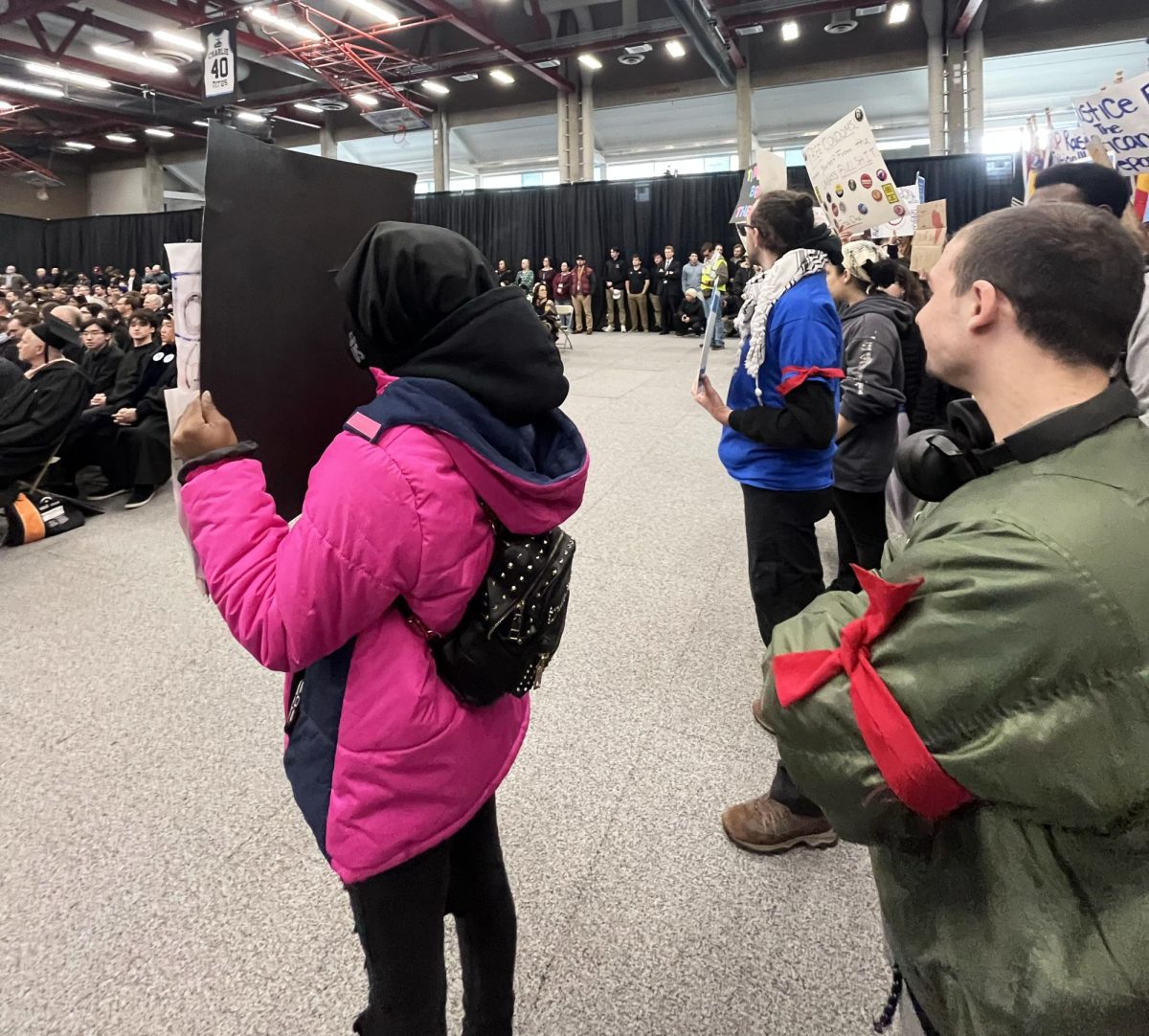The crowd was quiet as the national anthem played, the lyrics weaving a tale of American pride, justice and hope. With their hands over their hearts, and no words on their lips, the attendees of Chancellor Marcelo Suárez-Orozco’s inauguration turned and watched as a flood of protesters entered the room. They came in through the massive doors, piercing through the moment of sanctity.
Marching in with signs in their hands, the coalition represented the diversity of UMass Boston’s community. They were Black and Brown, disabled and able-bodied, students and staff, LGBTQ+ and allies. Some were unionized, others involved with organizations like the Africana Studies Department, the Labor Resource Center and even the Philosophy Club. Others were individuals, friends and acquaintances, all bonded by one mission. It was a call for accountability, a display of resistance and a reinforcement of hope.
Over the past few years, UMass Boston, one of the most diverse universities in the state of Massachusetts, has been the surprising location of conflicts surrounding anti-racism and suppression of student voices. Since 2017, the Africana Studies Department has been faced with unprecedented treatment from a university that Chancellor Suárez-Orozco has committed to making the “leading anti-racist and health-promoting public research university.” [1]
But, as the protest has proven, this goal has not been pursued; rather, it has been practically dismissed. In the case of the Africana Studies Department, the university twice decided to cancel searches for tenure-track faculty, and finally, hired three new faculty externally. There were no members of the Africana Studies Department on the final search committee. [2]
In 2022, the department chair, Dr. Jemadari Kamara, was removed from his position and replaced by a chairperson chosen by the university. That same year, Prince Lobel, a private law firm, was contracted to carry out a review of the department. It cost $250,000 dollars, and the report was never released in full.
In the snippets of information that the UMass Boston community was able to access, the university claimed that the department had “experienced high turnover and internal leadership challenges.” [2] Unfortunately, these events were just a part of the struggle that the Africana Studies Department has faced recently.
—
As the protesters marched through the UMass Boston campus, they raised their colorful posters in the air, inscribed with various slogans. They called for the university to take accountability and to truly become an institution that is dedicated to the needs of their diverse student body.
Words are not enough to make a serious impact—there needs to be constructive action to support them. Words that aren’t acted upon are just letters, suspended in the air as they are spoken into the universe. This is precisely why UMass Boston’s so-called dedication to fostering a safe, welcoming campus community has not become a reality.
Those words that call for progress and promise a space for all UMass Boston students sparkle on the surface but have a dark underside. Hundreds of members of the UMass Boston community can attest to this, from the unions on campus to the students affected by the rise in tuition. [3]
All have been subject to some form of ill-treatment from the university, such as having their demands being ignored or their actions scrutinized. These responses do nothing to make UMass Boston better; they simply provoke further questions about the legitimacy of the university’s “progressive” mission.
On Friday, the UMass Boston community did more than just paste letters together. They used their words to weave a loud, public tale of resistance and pride. As dozens of students and faculty chanted, gave testimonies and demanded the world’s attention, they transformed words into action. They did what the university has been unable to do for the past few years in two hours.
And these brave UMass Boston activists proved that despite the pain and struggle that they have faced, there was no loss of strength in their mind or pride in their dreams. It was proven by the reverberating, transformative power of their words. And on that chilly morning, their words grew vivid wings and took flight.
SOURCES:
[3] https://www.bostonherald.com/2024/04/05/cheers-and-jeers/





















































